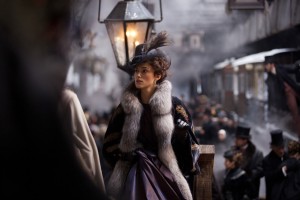 I finally got round to finishing Tolstoy’s epic novel Anna Karenina. I can hardly do it justice in a single post. It’s a stunning piece of work, with enormous scope, although very different in focus than War and Peace.
I finally got round to finishing Tolstoy’s epic novel Anna Karenina. I can hardly do it justice in a single post. It’s a stunning piece of work, with enormous scope, although very different in focus than War and Peace.
Tolstoy’s earlier work covered grand themes – the Napoleonic wars, the intrigues of kings and generals, invasion, devastation, and the climactic battle at Borodino. Anna Karenina, in contrast, focuses on intimate details of the lives of a group of Russian minor nobility. They talk, they fight, they fall in love, they misunderstand each other, they argue about politics. Some search for significance in work, or in religion, or in social enterprise. All are self-centred to a greater or lesser degree.
Strangely, Anna herself is probably the least developed character in the book. She is quite deliberately presented as having no redeeming features other than her beauty and charm, and no goal in life other than her own happiness. But against the backdrop of her intense love affair, her friends and relatives all go through their own crises, and all change in one way or another. And behind all this we are given a vividly detailed view of Russian life in the 1870s. Trains and telegraphs are beginning to replace horses and letters. The nobility continues to attend endless streams of operas and races and social functions. Intellectuals wrestle with the new ideas that are sweeping Europe – new forms of art, new forms of government, tensions between liberals and conservatives, discussions about the role of the church and the state, or the relationship between the mind and the body. Discussions that frequently feel startlingly relevant to today. And in the background, 80 million peasants work the Russian soil, mostly oblivious to the social upheaval that is stirring around them.
Throughout the whole book, Tolstoy gently satirises artists, politicians, fashionable society, and even himself, through the character of Levin, who is obviously an author stand-in. In fact, by the end of the book you realise that it is far more about Levin and his family than it is about Anna. To a large extent the book serves as a vehicle for Tolstoy to express his observations on the society around him, and explore his own changing convictions. The last section, in which Levin and his brother discuss how easy it is to manipulate society into wanting to go to war, clearly anticipates his later work, The Kingdom of God is Within You. A book which, along with those by Clausewitz and Sun Tzu, I consider one of the three most important books on war ever written.
Anna Karenina was adapted into a movie last year. I can’t imagine how they manage to cram the scope of this vast novel into two hours – I suspect a miniseries at least would be needed to do it justice. It is, of course, a book of daunting length. But I thoroughly enjoyed all the time that I spent with it.